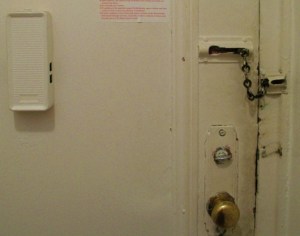 In an op-ed yesterday in the New York Post, Nicole Gelinas of the right-leaning Manhattan Institute makes yet another case against rent-regulation in New York City apartments, a timely topic given the looming deadline for the current regs and all the recent mishegosh in Albany as a result.
In an op-ed yesterday in the New York Post, Nicole Gelinas of the right-leaning Manhattan Institute makes yet another case against rent-regulation in New York City apartments, a timely topic given the looming deadline for the current regs and all the recent mishegosh in Albany as a result.
Curbed has a great breakdown of Gelinas’ arguments, but basically they boil down to: the cheap-o apartments that generally make up the city’s regulated stock are not going to suddenly become more desirable to more affluent tenants. In other words, kids, there will still be cheap options out there in a totally market-rate New York City. Everybody relax. Let that invisible hand in there. Yeah, that’s it.
Obviously, in a freer market, a newly renovated apartment in an elevator building near midtown Manhattan would still go for far more than a shabbier walk-up an hour away by subway. That’s life.
But a Facebook founder or Goldman Sachs partner isn’t going to suddenly covet that two-bedroom apartment in an aging building off the Belt Parkway, demolishing New York’s middle class.
Of course, left out of this argument (and I can’t imagine why) is the inevitable trend should these shabbier apartments be deregulated: Landlords, if they’re smart (and most are very much so), will eventually renovate them and big time. That aging building off the Belt will find itself awash in paint fumes, its front door co-opted by moving men trundling in newer appliances, its stairwells teeming with electricians, carpenters, sundry contractors, etc., going up and down.
The improvements will spur higher rents, of course. Which is the whole point on both sides of the issue—landlords understandably want them; regulated tenants do not. (And, also, quickly: Though the exact locations are largely unknown, I would wager a larger number of regulated apartments are closer to that elevator building near midtown Manhattan than to that aging building off the Belt Parkway. Those midtown rents will go WAY up.)
Massachusetts ended rent regulations on most apartments in 1994. Boston and its suburb Cambridge were among the state’s few municipalities that still had wide-scale rent controls (in Cambridge, for instance, two-thirds of apartments in buildings with at least four units were regulated). Here’s what I wrote about this in 2007:
Within a few years of deregulation, rents were way up, especially in Cambridge, a city of about 100,000 where tenants are similar socioeconomically to those in New York and where the housing stock is also similar. …
Five years after Massachusetts voters ended rent regulation … in Boston, Brookline and Cambridge,” began a New York Times article from July 2000, “rents have taken sizable jumps, the cities are spiffier and less pockmarked by deteriorating neighborhoods and many poorer people have been forced to move to communities farther from the urban core. … [A] leading landlord in Cambridge found that rents for his company’s formerly controlled apartments have doubled.” [emphasis mine]
The shabbier apartments will not stay that way post-deregulation. I’m not arguing pro nor con (I live in a market-rate apartment). Just keep in mind things are not static in this city, housing stock included.
tacitelli@observer.com :: @tacitelli



